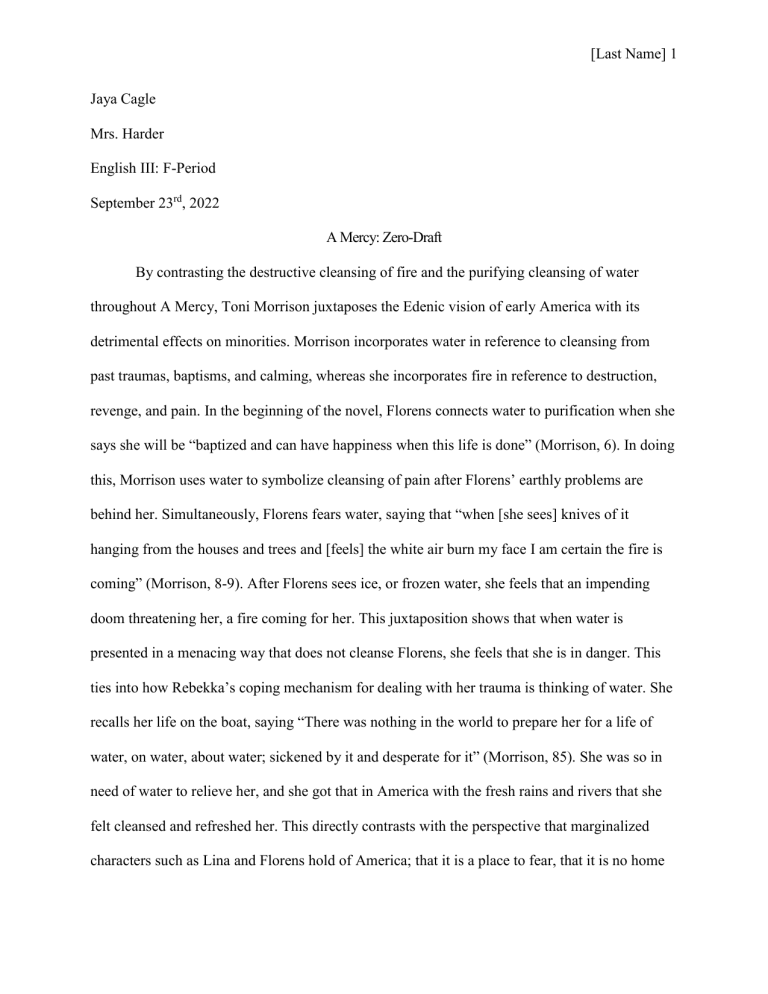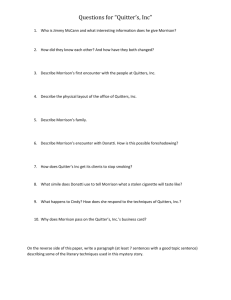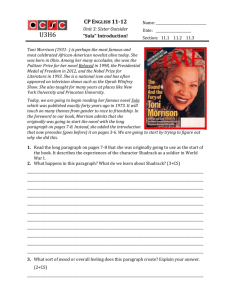
[Last Name] 1 Jaya Cagle Mrs. Harder English III: F-Period September 23rd, 2022 A Mercy: Zero-Draft By contrasting the destructive cleansing of fire and the purifying cleansing of water throughout A Mercy, Toni Morrison juxtaposes the Edenic vision of early America with its detrimental effects on minorities. Morrison incorporates water in reference to cleansing from past traumas, baptisms, and calming, whereas she incorporates fire in reference to destruction, revenge, and pain. In the beginning of the novel, Florens connects water to purification when she says she will be “baptized and can have happiness when this life is done” (Morrison, 6). In doing this, Morrison uses water to symbolize cleansing of pain after Florens’ earthly problems are behind her. Simultaneously, Florens fears water, saying that “when [she sees] knives of it hanging from the houses and trees and [feels] the white air burn my face I am certain the fire is coming” (Morrison, 8-9). After Florens sees ice, or frozen water, she feels that an impending doom threatening her, a fire coming for her. This juxtaposition shows that when water is presented in a menacing way that does not cleanse Florens, she feels that she is in danger. This ties into how Rebekka’s coping mechanism for dealing with her trauma is thinking of water. She recalls her life on the boat, saying “There was nothing in the world to prepare her for a life of water, on water, about water; sickened by it and desperate for it” (Morrison, 85). She was so in need of water to relieve her, and she got that in America with the fresh rains and rivers that she felt cleansed and refreshed her. This directly contrasts with the perspective that marginalized characters such as Lina and Florens hold of America; that it is a place to fear, that it is no home [Last Name] 2 for them. For example, Lina reflects on “Fire. How quick. How purposefully it ate what had been built, what had been life. Cleansing somehow and scandalous in beauty”, saying that she is still afraid of it whenever she sees even the smallest flame (Morrison, 57). By contrasting these two different types of cleansing and the different reactions that two kinds of characters have to each, respectively, Morrison presents a duality of cleansing in this time period based on a character’s role in the novel’s power dynamic. This plays a role in the larger theme of two microcosms presented within the novel: the white settler’s Edenic vision of America versus the oppressed characters’ racist reality. Rebekka, a privileged character, enjoys America, posing the rhetorical question, “America. Whatever the danger, how could it possibly be worse?” (Morrison, 91). She is able to view the new country through a privileged lens because she does not have to live the realities of slave labor and racism. Considering that Morrison incorporates how Rebekka views America’s water as purifying, we can see how this view of America is a foil for the harsh reality of the world. However, later in the novel, as Florens and Lina begin to become more independent from this reality and they each come to terms with their identity, they reclaim fire as a mechanism against the very forces that used it against them. For example, as Florens is writing her story on the walls of Jacob’s old house, she is “holding light in one hand and carving letters with the other” (Morrison, 188). This symbolizes how she is using fire to help her though coming to terms with and reclaiming her identity. However, Morrison really presents fire with a changed function when she says that Lina would help Florens burn the house down because she “finds horror in this house and as much as she needs to be Mistress’ need [Florens knows] she loves fire more” (Morrison, 188-189). This shows how marginalized characters like Florens and Lina reclaimed fire as they came to accept their identity. They used it as a weapon against Rebekka, which shows how they utilized fire to combat the so-called cleansing water that had been [Last Name] 3 oppressing them throughout the novel. This is significant to the greater plot of the novel because it is another method of contrasting the optimistic and blissfully ignorant perspective of characters that benefit from the imbalanced power dynamics of early America.


